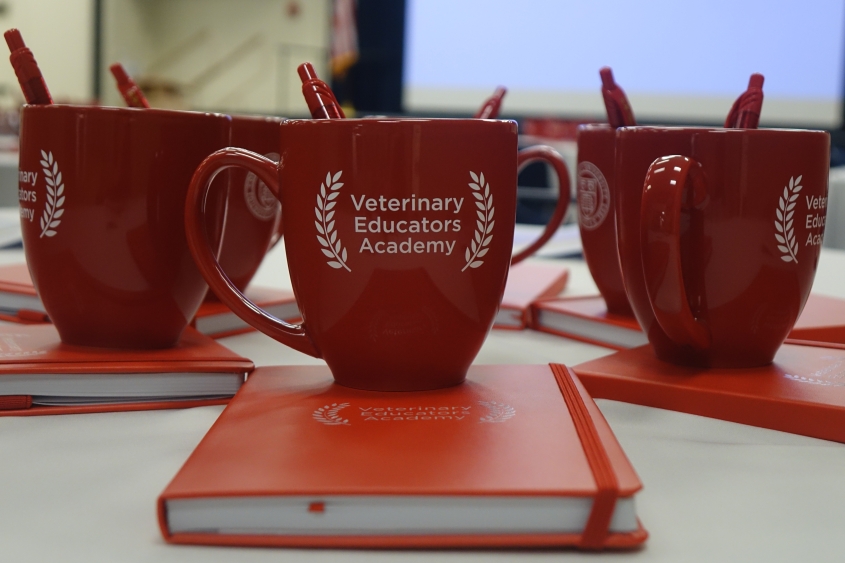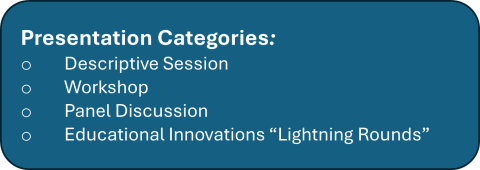Call for Proposals
The Conference
The conference theme will focus on how immerse technology and the digital age can be integrated into traditional and adaptive teaching and learning, and some examples include clinical skills and clinical simulations, practicing clinical reasoning, knowledge retention, digital knowledge, communication and professionalism, and assessment.
Keynote speakers will address these and related topics to stimulate our thinking and discussion.
Attendees are encouraged to submit short presentation proposals that showcase their work and share ideas. The Program Committee will identify and group common topics among the selected proposals. Presentations will be arranged in the conference’s program to encourage discussions among those with similar interests.
Submit your Presentation Proposal:
Proposals for presentations on topics related to the Conference theme are encouraged.
The presentations could be in one of the formats below. Preference will be given to proposals that address problems of significance to veterinary education, are clear and concise, and based upon principles of teaching and learning that are supported by the educational research literature. Submit presentation proposals as a single pdf file to Julia Felippe mbf6@cornell.edu
Proposals (blinded as to author and originating institution) will be reviewed by a committee that includes veterinary educators with a wide range of experiences. Reviewers will be asked to evaluate proposals using the following criteria:
- Proposal Quality: The written proposal is clear, complete, and well-organized. Clear proposals concisely explain the topic, goals, objectives, and format and are understandable for someone not familiar with the content area (please avoid jargon). The title matches description and abstract and is relevant, original, and intriguing.
- Purpose: The proposal includes clear goals/purpose and describes the benefit to target audience. The session objectives and plan are provided.
- Importance/Contribution to the Field: The proposal offers important results, creative or innovative practice or development, and/or an opportunity to enhance insights on a relevant or timely topic. It is generalizable and portable; it includes strengths and weaknesses. Conclusions are well supported. Suggestions are offered for further study.
- Preparation: The proposal is well-grounded in a theoretical/conceptual framework, relevant literature, and/or prior work. It demonstrates authors’ familiarity with the topic. The methods match intended purpose of the proposed presentation.
- Presentation: The proposal describes methods/activities and a detailed plan for use of time that will engage participants, encourage reflection and critique, and achieve the goals/purpose of the proposed presentation. Format and content should fit session type.
- Audience Appeal: The proposal represents work or addresses a topic or issue that relates to the conference theme and is relevant or important to veterinary educators.
Descriptive Session provides overviews or results of projects, programs, or strategies. Each Descriptive Session will include 10-15 minute presentation with time allotted for audience discussion and exchange.
Submit a structured proposal in 800 words or less that includes the sections described below:
- Abstract: Provide an abstract of the session in 50 words or less. If accepted, this abstract will be included in the conference program.
- Introduction: Describe the background, literature review, and/or needs assessment
- Program: Describe the methods of the study or the design of your program or project
- Results: Display and discuss the results of your data analysis or the evaluation of your project or program
- Conclusion: Conclude with a summary, impact, and limitations
- Reference List: List of relevant references used to place the proposed presentation in the context of current thought and practice. This does not count toward the proposal word limit.
Workshop is an instructional session in which presenters teach particular skills or techniques. The session should accomplish specific learning objectives designed to provide participants with increased competence in an area of veterinary medical or technology education. The session should include opportunities for practice and feedback. When this is not possible, the session must include time to discuss how skills can be applied in the participants' work settings. The duration of a workshop is 90 minutes.
Submit a structured proposal in 800 words or less that includes the sections described below:
- Abstract: Provide an abstract of the session in 50 words or less. If accepted, this abstract will be included in the conference program.
- Proposed Skill: Clearly describe the skill you propose that the participants will learn during the session.
- Rationale/Background: Why is the proposed skill one that veterinary educators need? What is the background and significance of your proposal?
- Learning Activities: Exactly how will you involve the participants in skill development (e.g., role-plays, paper cases, videos, etc.)? How much time will you allot to each activity of the proposed session?
- Reference List: List of relevant references used to place the proposed presentation in the context of current thought and practice. This does not count toward the proposal word limit.
Panel Discussion features more than one individual presenting their ideas regarding a specific issue or topic, and responding to questions. A moderator will facilitate panel comments and audience participation. Panel discussion sessions can be 60 or 90 minutes.
Submit a structured proposal in 800 words or less that includes the sections described below.
- Abstract: Provide an abstract of the session in 50 words or less. If accepted, this
- Rationale/Background: What is the background for the panel discussion topic?
- Panelists (including the Moderator): List the participating panelists. Include their titles or professional roles. Explain how each panelist will contribute to the discussion.
- Session Outline: In general terms, explain how you propose the panel discussion will proceed. Indicate how much time each panelist will use and how the audience will be involved.
- Reference List: List of relevant references used to place the proposed presentation in the context of current thought and practice. This does not count toward the proposal word limit.
abstract will be included in the conference program.
Educational Innovation Lightning Rounds provides participants with an opportunity to learn from peers about several innovative educational approaches in a relatively short period of time. Presenters will be limited to 8 slides that advance automatically at pre-set intervals, for a total of 7 minutes.
Submit a structured proposal in 250 words or less that includes the sections described below.
- Rationale: Educational Technology approach/topic and explain why it is timely and important to veterinary education.
- Introduction: Describe the background, literature review, and/or needs assessment of the topic.
- Outcomes: Identify the goals of addressing the proposed topics.
- Discussion Triggers: Identify questions for discussion that are central to achieving the desired outcomes.




